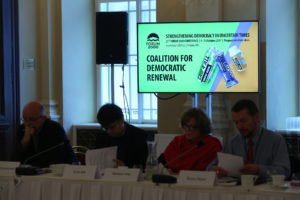
Credit: DFRLab
Lithuania celebrated the 100th anniversary of its independence and democratic statehood on February 16, an exercise that showed the country’s understanding that it must keep its democracy vibrant and forward-looking, notes Carl Gershman, the President of the National Endowment for Democracy.
 The initiation of such a process of democratic renewal at a time when Lithuania’s national consciousness is relatively robust is an encouraging sign that this small country doesn’t take its democracy for granted. Unfortunately, that’s not the case in many other Western democracies today, he writes for World Affairs:
The initiation of such a process of democratic renewal at a time when Lithuania’s national consciousness is relatively robust is an encouraging sign that this small country doesn’t take its democracy for granted. Unfortunately, that’s not the case in many other Western democracies today, he writes for World Affairs:
Indeed, it is well known that the world is now in the midst of a grave crisis of democracy. The mood of confidence in the inexorable progress of democracy that prevailed after the collapse of communism in 1989-91 has been replaced by pessimism and apprehension. The latest Freedom House survey released last month provides troubling evidence of the retreat of democracy. It reports that political rights and civil liberties in the world have declined for the 12th consecutive year, with new and established democracies dominating the list of countries suffering setbacks in freedom.

21st Forum 2000 Conference
“It was to address this crisis that the National Endowment for Democracy, in cooperation with the Czech organization Forum 2000, convened a meeting last May of several dozen public intellectuals and democracy advocates who adopted a statement called The Prague Appeal for Democratic Renewal, which opened with the declaration that ‘Liberal democracy is under threat, and all who cherish it must come to its defense,’” Gershman adds. RTWT
Lithuania is regularly targeted by Russian disinformation, the Atlantic Council’s DFRLab reports. On March 5, Lithuanian news portal Delfi.lt reported on a video with false subtitles spreading in the Ukrainian information space. The video allegedly depicted Lithuania’s Minister of Defense Raimundas Karoblis (above) recognizing Russia-annexed Crimea as part of the Russian Federation. He wasn’t, it adds, in DFRLab’s latest #BalticBrief: Read More →







